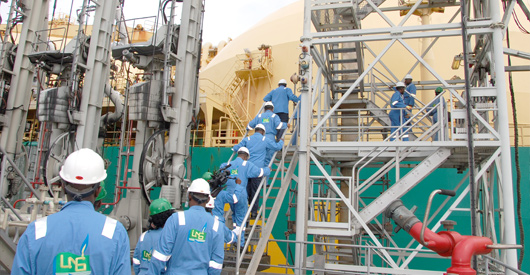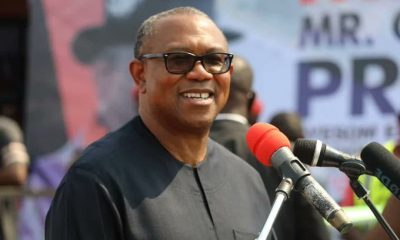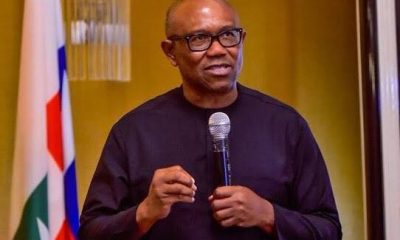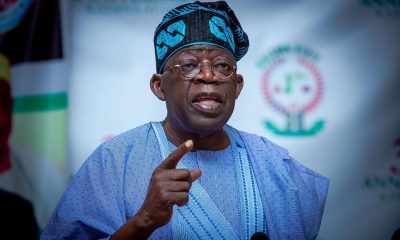Headlines
REVEALED: How Italian energy giant ENEL saved Nigeria LNG from collapse

BY KAZIE UKO
A former Managing Director of Nigeria Liquefied Natural Gas (NLNG) Limited, Dr. Godswill Ihetu, has revealed how Italian energy giant, ENEL, changed the fortune of NLNG, and saved the company from early death.
Writing as a guest in the widely acclaimed intellectual interventionist column on economy, ‘Outside the Box’, a fortnightly written by economist, Dr Alex Otti, in Thisday newspaper, Ihetu recalled how the coming of ENEL into the NLNG changed what would have been an economically unviable venture to what today has become a major backbone of Nigeria’s economy.
Ihetu, a one-time Managing Director of Nigerian Gas Company (NGC) as well as GED, Engineering & Technology, NNPC, said the 1986 nuclear power accident in Chernobyl in present day Ukraine, described as the worst nuclear disaster in history, provided the opportunity for the NLNG to break through into the global gas market, after the advanced economies of the world had sort to phase out all other energy fuels but nuclear.
According to Dr Ihetu, the Chernobyl nuclear reactor accident which claimed thousands of human lives in the then Soviet Union, dealt serious blow to the plans to scale up nuclear, described as clean and efficient, to address the issue of climate change.
READ: Why NNPC is investing in Dangote refinery – Kyari
“This accident dealt a blow to the plans to scale up nuclear to address climate change issues. Consequently, several countries, including Germany, opted to phase out nuclear energy. Natural gas was called to step into the gap. Germany increased its gas import from Russia even against opposition from the United States. Obviously, the safety and reliability of nuclear energy cannot be guaranteed. Whereas the French had invested substantially and were perhaps comfortable with retaining their plants, the Italians were not. In 1989, Italy voted in a referendum and rejected further use of nuclear power plants. ENEL, the national electricity company of Italy, was in a panic and started looking for gas frantically. Probably, without the Chernobyl accident our LNG project would not have taken off when it did. Here is how.
“Nigeria LNG was incorporated in 1989, and as with all gas sales projects, you must find a long-term customer before you commit to construction of your facilities. NLNG had offers to sell gas to France, USA, Italy and Spain. The prices being offered were not attractive enough to make the NLNG project economically viable. Then suddenly we were approached by ENEL. In their desperation they were willing to buy at prices which were double those already being offered by other buyers. We grabbed the opportunity and were willing to offer almost 50% of our capacity to ENEL. That singular transaction changed the economics of the NLNG project and made it viable. I should add that the agreement, signed in 1991 with ENEL, is still in place to this day,” Ihetu wrote.
READ: NNPC says will work with Petroleum Ministry to substitute petrol for natural gas
The Nigeria LNG Limited, a joint winner of World LNG Award for ‘Most Outstanding Contribution’ in the gas industry for 2020, is considered one of the most important economic projects in Nigeria. Since it began operations in 1999, when it shipped its first LNG cargo, the company said it has brought significant economic benefits to Nigeria.
These include to date dividend payment to the Federal Government of Nigeria, to the tune of about USD18 billion, courtesy of its shareholding in the company, through the Nigerian National Petroleum Corporation (NNPC).
Apart from contributing to national wealth and the economic wellbeing of states in which it operates, by paying all applicable taxes and tariffs, the company is said to have paid about USD9 billion in taxes to the Federal Government.
It has also since inception remitted to the Federal Government through its shareholding in NNPC about USD15 billion for Feedgas.
With 51% stake by international oil companies (IOCs) and 49 per cent to Nigeria, held by the NNPC, the NLNG, since 2008, has contributed about four per cent of Nigeria’s annual Gross Domestic Product (GDP). With rebasing of the GDP in 2014, the company’s contribution to the GDP is estimated at about one per cent, according to information on its website.












